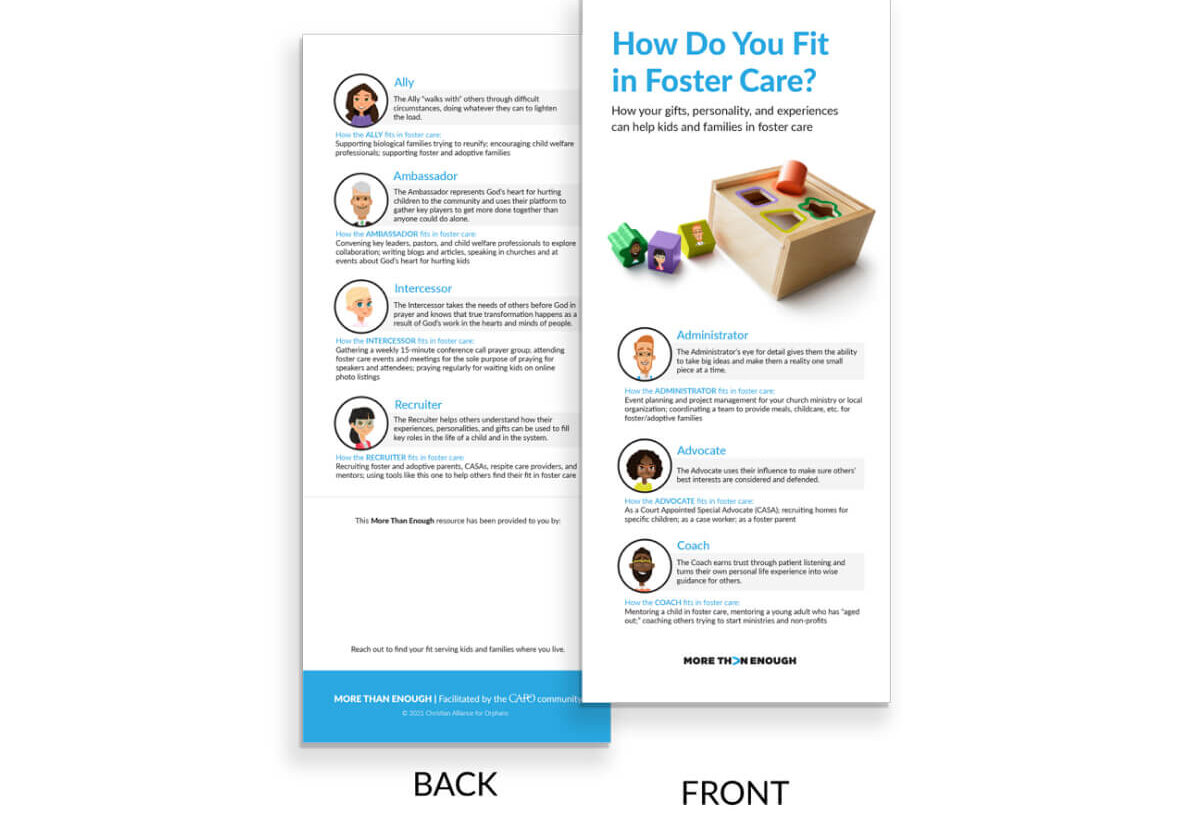Getting Started
Whether you are considering foster parenting, adoption, or another way to impact children and families, you are in the right place.
Here are three key questions you may be considering:
Is foster parenting for me?
Should I consider adopting a child?
How else can I make a difference for children and families?
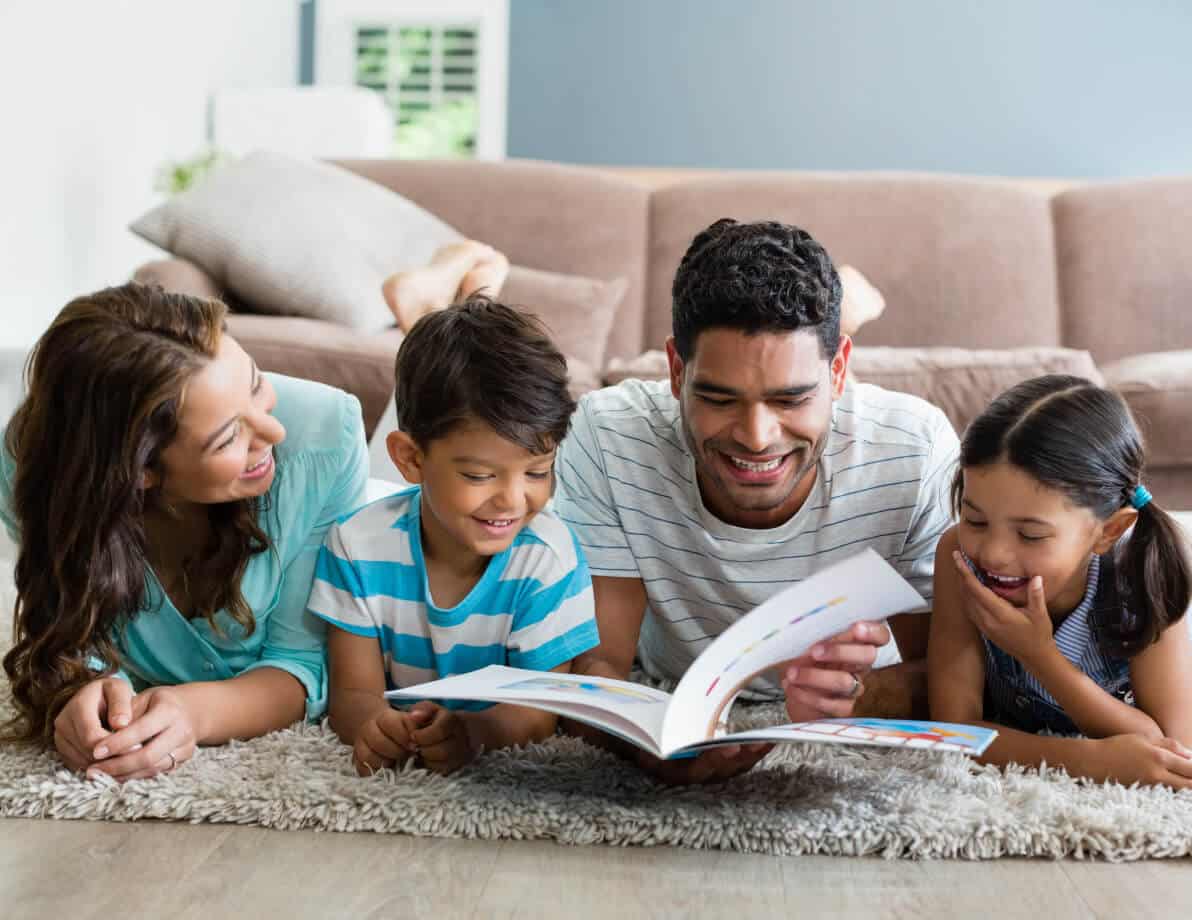


Is foster parenting for me?
Internet searches and advice from family and friends may have you a little overwhelmed. You're in the right place! Here are some simple answers to some of your questions that can make it easier for you to make an informed decision about becoming a foster parent.
Congratulations — it sounds like you are normal! Couples rarely if ever start out on the same page when it comes to foster care. While you should certainly come to a place of oneness on this issue before bringing a child home, there are some steps you can take to create an environment for meaningful and important conversations that will help get you there.
The Jason Johnson Blog offers some of these conversation starters in the blog posts, “10 Questions Couples Should Ask Before Becoming Foster Parents” and “Fostering or Adopting for the Husband Thats Not Sure”.
This is a really important question. Foster care isn’t easy for anyone involved in it, and that includes the children already in your home. However, “not easy” doesn’t equal “not good”. In fact, if we are honest, it is the “not easy” things in our lives that have usually been the most worthwhile. There are some important considerations for the children already in your home and we can help you explore what some of those are.
Jana Hunsley, a Graduate Research Assistant at the Karyn Purvis Institute of Child Development (KPICD) and an adoptive sibling wrote this article, “Lessons from Adoptive Siblings”, to help parents understand how changing family dynamics affects everyone in the home. Jayne Schooler also addresses “Understanding the Impact of Foster Care and Adoption on Children Already in the Home” in this article with Focus on the Family.
Finally, if a podcast is more your speed, listen to Frantz and Stephanie Guignard talk about “Foster Care and Your Family” on the Foster Movement Podcast.
Singles can make amazing foster parents! Having a supportive community is important for anyone considering foster parenting, but this is especially true for singles. There are some things you’ll want to think through in terms of your career, your dating life and your support system. There are some other singles that have navigated these things and can help you do the same.
Hallie Graves shares “How Did I Decide to Become a Single Foster Mom” at the Archibald Project. Jillian Kellenberger breaks down some of the harder parts of single foster parenting at The Forgotten Initiative in this post, “The Struggle of Single Foster Parenting”.
It certainly feels that way, especially at the very beginning. Just like climbing a mountain, your best bet is to pick a path and start by taking the very first steps. Which by the way, your being here shows that you’ve already started. We can help you take the next ones. Before you know it, you’ll be at the top. The Foster Movement Podcast, “Process and Paperwork” dives into starting the process with veteran social worker, Jailynn Smiley.
It is normal to have some reservations about interactions with biological family members of children that come into your home. For most foster parents, it takes a little time and experience to find their groove on this issue. Like most things in foster care, your perspective now will not likely be the same a year or two from now. Be open to taking some first steps down the road of learning more and see where it leads you.
On the More Than Enough Podcast Episode “Surprised by Love”, biological mom Crystal Story shares about overcoming addiction and bringing her daughter back into her home with support, encouragement and love from her daughter’s foster mom, Holly.
Yes, it can be. In fact, frustrations with the system itself are among the top reasons foster parents stop fostering. However, there are a couple of important things to keep in mind. First, very often the professionals involved are just as frustrated with the system as you are (which is why their turnover rate is also very high). Second, imagine being a child in that system whose very future hinges upon some of these frustrating realities. They are going to experience the results of those realities with or without you. Chances are, doing it with you will be better for them.
Jamie Finn from Foster the Family offers encouragement in her blog post, “Stop using the broken system as an excuse”.
Parenting children who have experienced trauma doesn’t necessarily take a “special person” (as is often said about foster parents). Instead, it just takes a regular, flawed person who is open to learning and growing. There is a lot more information and support out there than ever for parents who navigate these realities. If you lean into them, you can do this.
We recommend listening to the Foster Movement Podcast Episode 18 “Parenting Kids from Hard Places with Joanna Torres and Kayla North”. Show Hope has also compiled an extensive list of parenting books and resources found here.
The answer to this question will ultimately have the single biggest impact on your ability to stick with foster parenting through the hard things. There are conversations to be had with friends and family as you go through the process. There are also people you don’t even know yet who will become some of your greatest sources of support — if you know where to look for them.
Focus on the Family offers encouragement for all grandparents here. For those looking to support foster and adoptive families in their community – check out Jason Johnson’s blog post “Wrapping Around Foster and Adoptive Families”.
If you think foster parenting might be for you, your next step is to attend an orientation meeting for an agency or two. Once you are matched up with an agency (public or private depending on your state), they will be able to very clearly map out your next steps. Now is a great time to listen to social worker Jailyyn Smiley on The Foster Movement Podcast, “Process and Paperwork”, or read “How to Choose a Foster Care Agency“ by Holly Gnuse at The Forgotten Initiative.
Now, if after exploring foster care, you don’t feel that foster parenting is for you (at least right now), we are so glad you have some clarity on that! There are SO MANY other ways you can be involved in making a huge difference for children and families. We would like to help you take the next step to find your fit in foster care. We have created 7 videos and this PDF to get you thinking how to best use your gifts and talents on behalf of children and families in your community!
Should I consider adopting a child?
There is a lot of information out there about adoption. So much, in fact, that it can feel a little overwhelming. You wonder who you can trust and where you can go to get your questions answered. Here are a few answers to some common questions that can make it easier for you to make an informed decision about pursuing adoption.
There are many children in the U.S. and around the world in need of a loving permanent family. Becoming an adoptive parent is not God’s plan for everyone but it very well could be part of His plan for you. We have listed a series of resources throughout this FAQ section to introduce you to the best thinking about adoption from other adoptive parents, professionals, and adult adoptees. If you are looking for some clarity, you have come to the right place.
It can be but certainly doesn’t have to be. In almost every case, expenses associated with adoption from U.S. foster care (paperwork, training, case management, background checks) are subsidized by the government and are therefore not passed on to the adoptive family. In other words, adoption from U.S. foster care is free or nearly free. Costs for international and private domestic adoption vary based on a number of factors. We recommend asking for a complete fee schedule from a reputable agency to better understand what expenses might be involved. A good agency will walk you through each of these expenses so that you have a strong understanding of what is expected and why. Be sure to be thorough in this process and understand everything before signing anything.
It is important to note that there are now MANY resources available to help offset some of the costs associated with adoption. Here are some things to explore:
- There are foundations and organizations that have been established specifically to offset adoption costs. This can include grants and no-interest loans. To learn more about members of the Christian Alliance for Orphans that do this, click here.
- Your church may have an adoption assistance fund.
- Your employer may have adoption assistance available. Check with your HR department to learn more.
The struggle of infertility is incredibly hard. When that is combined with the complexity of potentially parenting a child who has been separated from biological family, there are two important things to consider:
- It is normal to initially feel like adoption is plan B — something you were forced to resort to because plan A did not go as you had hoped. However, we recommend you give yourself and your spouse enough time to process this dynamic before pushing ahead with adoption. It is important that by the time you adopt, you become convinced that adoption is God’s plan A for your life at this time. It’s important that no child who comes to your family through adoption feels like plan B to you or to them.
- If you have experienced infertility and are considering what is sometimes referred to as “foster-to-adopt” where a family fosters a child whose parental rights are likely to be terminated, we would urge extreme caution. Even when termination of parental rights seems likely, things in foster care can often change quickly. One of the most important characteristics of any foster parent is that they will willingly and faithfully work with all parties involved toward the reunification of a child with their biological family. This can be particularly difficult for those who have experienced infertility. It is generally more advisable to pursue the adoption of a child that is already available for placement.
Congratulations — it sounds like you are normal! Couples rarely if ever start out on the same page when it comes to adoption and foster care. While you should certainly come to a place of oneness on this issue before bringing a child home, there are some steps you can take to create an environment for meaningful and important conversations that will help get you there.
The Jason Johnson Blog offers “Fostering or Adopting for the Husband That’s Not Sure”.
This is a really important question. Adoption and foster care are not easy for anyone involved in it, and that includes the children already in your home. However, “not easy” doesn’t equal “not good”. In fact, if we are honest, it is the “not easy” things in our lives that have usually been the most worthwhile. There are some important considerations for the children already in your home and we can help you explore what some of those are.
Jana Hunsley, a Graduate Research Assistant at the Karyn Purvis Institute of Child Development (KPICD) and an adoptive sibling wrote this article “Lessons from Adoptive Siblings” to help parents understand how changing family dynamics affect everyone in the home. Jayne Schooler also addresses “Understanding the Impact of Foster Care and Adoption on Children Already in the Home” in the article with FOCUS on the Family.
Singles can make amazing adoptive and foster parents. Having a supportive community is important for anyone considering adoption and foster parenting, but this is especially true for singles. There are some things you’ll want to think through in terms of your career, your dating life, and your support system. There are some other singles that have navigated these things and can help you do the same.
While these two particular articles are about foster parenting rather than adoption, there are several principles that will still be helpful. Hallie Graves shares “How Did I Decide to Become a Single Foster Mom” at the Archibald Project. Jillian Kellenberger breaks down some of the harder parts of single foster parenting at The Forgotten Initiative in this post “The Struggle of Single Foster Parenting”.
It certainly feels that way, especially at the very beginning. Just like climbing a mountain, your best bet is to pick a path and start by taking the very first steps. Which by the way, your being here shows that you’ve already started. We can help you take the next ones. Before you know it, you’ll be at the top. Once you identify a reputable agency, all of the other steps become much more predictable and manageable as a good agency will provide you with a very clear path.
It is true that children that come to us through adoption may have experienced trauma in utero through drug and alcohol exposure, in institutional settings, or in their families of origin. Anyone who has experienced significant trauma may demonstrate difficult behaviors that come as a result. It is important to be aware of this possibility and be ready to learn new parenting strategies and skills that support the specific needs of children who have experienced trauma. However, children still need parents ready to step into adoption if that is where God is leading them. The truth is that children who have experienced trauma are going to experience the effects of that trauma with or without you to walk with them through it.
We recommend listening to the Foster Movement Podcast Episode 18 “Parenting Kids from Hard Places with Joanna Torres and Kayla North”. Show Hope has also compiled an extensive list of pre- and post-adoptive books and resources found here.
If you think God may be leading you to explore adoption, your next step may be to attend an in-person or online orientation meeting for at least two or three agencies. Once you have selected an agency to work with, they will be able to very clearly map out your next steps. You can get connected to agencies that are members of the Christian Alliance for Orphans here.
Now, if after exploring adoption, you don’t feel that adoption is for you (at least right now), we are so glad you have some clarity on that! There are SO MANY other ways you can be involved in making a huge difference for children and families. To explore the possibilities click here.
You have gifts, personality traits and experiences that make you who you are.
We’ve grouped all these things into 7 faces of foster care engagement. You will likely find at least 2 that apply to you and will help you to understand the best ways for you to help kids and families in foster care where you live.
Check out these brief intro videos to each type to learn more about where you might fit in foster care:
The Administrator
The Administrator’s eye for detail gives them the ability to take big ideas and make them a reality one small piece at a time.
The Advocate
The Advocate uses their influence to make sure others’ best interests are considered and defended.
The Ally
The Ally “walks with” others through difficult circumstances, doing whatever they can to lighten the load.
The Ambassador
The Ambassador represents God’s heart for hurting children to the community and uses their platform to gather key players to get more done together than anyone could do alone.
The Coach
The Coach earns trust through patient listening and turns their own personal life experience into wise guidance for others.
The Intercessor
The Intercessor takes the needs of others before God in prayer and knows that true transformation happens as a result of God’s work in the hearts and minds of people.
The Recruiter
The Recruiter helps others understand how their experiences, personalities and gifts can be used to fill key roles in the life of a child and in the system.
For Me and My Family Resources
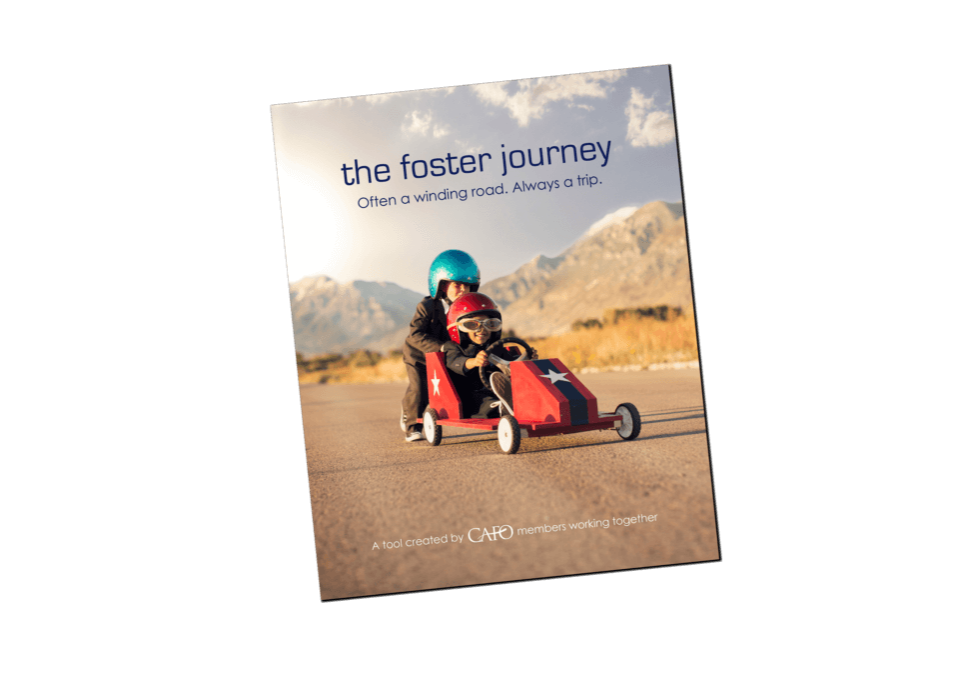
The Foster Journey: Often a Winding Road. Always a trip.
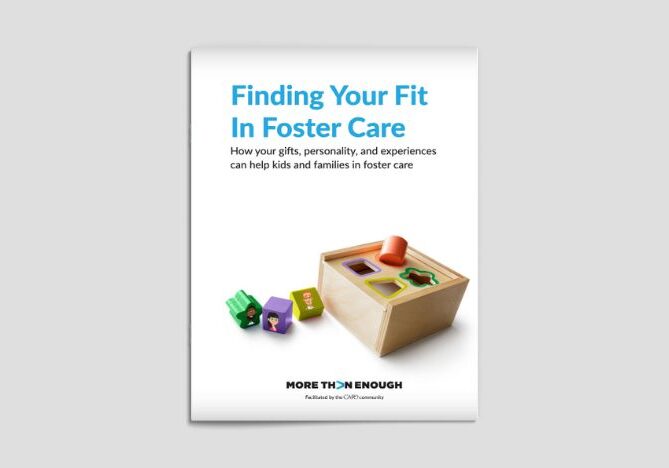
Find Your Fit in Foster Care: How Your Gifts, Personality and Experiences Can Help Kids and Families in Foster Care
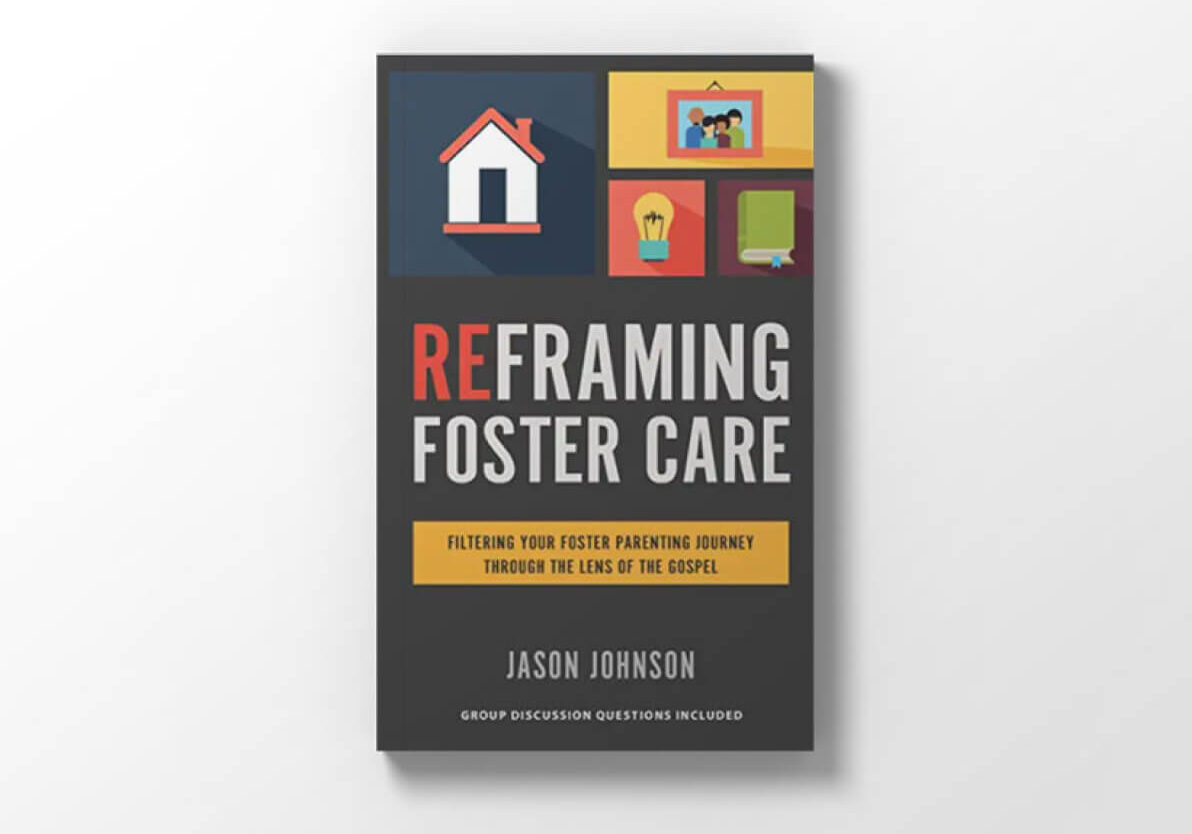
Reframing Foster Care
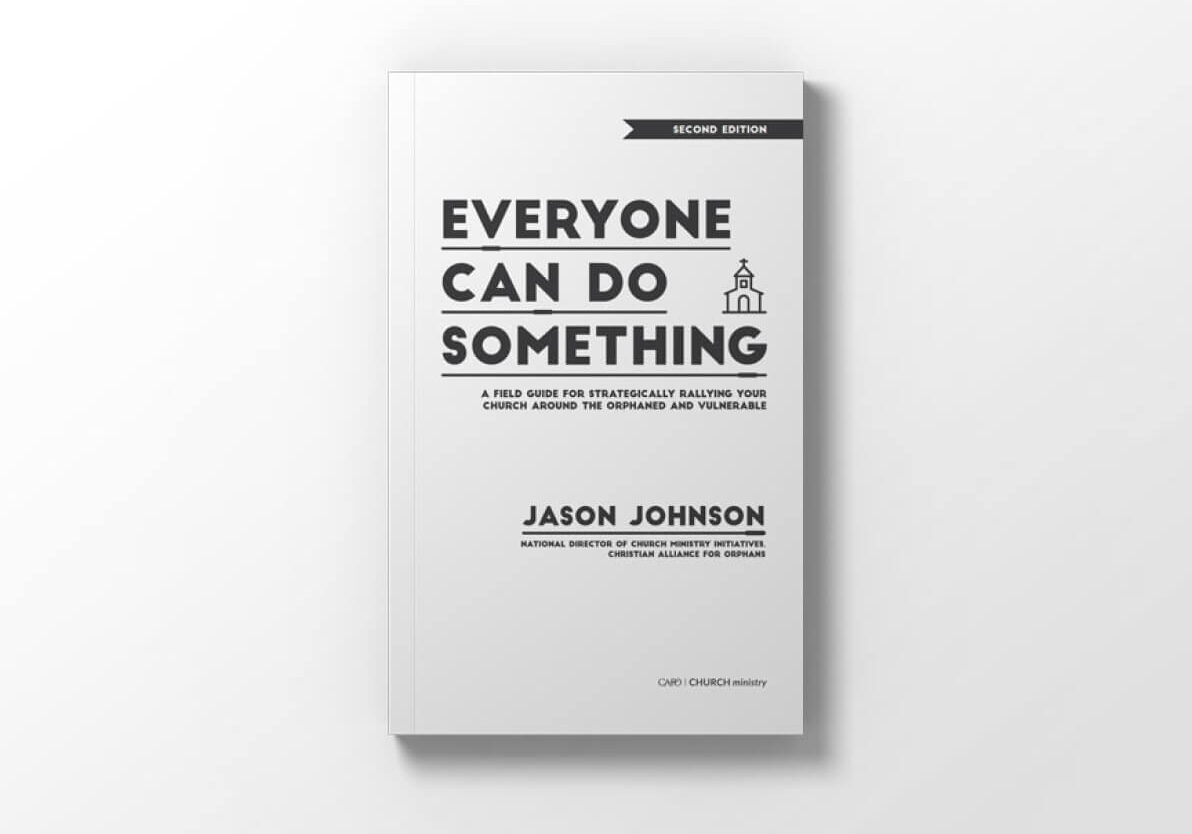
Everyone Can Do Something
